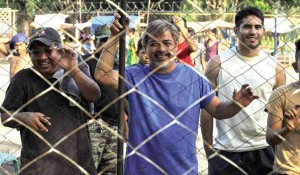If you ask any Pinoy cineaste who the top five outstanding local actors are, Joel Torre’s name would definitely be on the list. Joel has outdone himself again by bagging the best actor award at the recent Puchon International Fantastic Film Festival in South Korea for his brilliant portrayal as a hitman in Erik Matti’s “On the Job,” which will be shown on Aug. 28 nationwide.
Another role that Joel relishes is being a restaurateur. His JT’s Manukan recently opened its 12th branch on 18th Street in his hometown, Bacolod.
Joel and I have this Ilonggo bond, which I treasure. He is so cool and down-to-earth. I guess what makes him a damn good actor is that he’s not full of himself, which leaves enough room for him to portray someone else so convincingly.
Let’s get to know the inner workings of our icon, JT.
What’s the secret formula of great acting?
The ultimate (formula) would be if an actor could be able to bare his soul then that’s art. Real talent lies in the subconscious.
Do you believe actors are born not made?
Actors are both born and made. There are actors who have raw talent but then don’t cultivate it. Then there are like people who can’t distinguish their left foot from their right, who turn out to be great dancers.
What do you think made you clinch the best actor award in Korea?
I don’t know what made me win. It’s a judgement call by the jury. I was so relaxed with my role in “On The Job,” like I wasn’t acting.
What’s more important to you: box-office success or winning awards? Why?
The marriage of box-office success and awards would be ideal.
Which of your movies are you most proud of?
There are a lot of films I am proud of, such as “Oro, Plata, Mata,” “Karnal,” “Batang West Side,” “Bayaning 3rd World,” “Amigo” and “On the Job.” If there’s a retrospective those would be on top of my list.
What would you like to change or improve in the industry?
Given the chance, [I’d like to improve] the system … to professionalize it more, [to address problems] like long work hours, the residuals or royalties for intellectual properties, that instead of a guild we should have unions, and that government should look at our films as part of our culture. The great Filipino films are expressions of Filipino culture that should be treated as national treasures. Hope the government could help out in funding, marketing and distributing potential great works.
What are the three tips you can give young actors today, who rely mostly on good looks alone?
Invest in your craft; learn, learn, learn for there’s no end to learning. Try to be the best in your job—that’s also true in any field of endeavor. Love your work—that way you don’t work a single day of your life.
What was the hardest role you ever portrayed?
One of the hardest would be Mike de Leon’s “Bayaning 3rd World,” playing Jose Rizal and being able to capture the aura and presence of Pepe in a black comedy. Another would be John Sayles’ “Amigo” where my role is in 90 percent of the story. Here’s a Pinoy who is the main character in an international film, acting beside Oscar winner Chris Cooper. Now if that’s not pressure I don’t know what it is.
How do you handle days when you’re not in the mood to act or you feel burnt out?
As a professional actor, you’re expected to deliver a performance. You should be able to do a scene no matter how many times it takes.
Is there any role you would refuse to portray and why?
As an actor you are supposed to play anyone or anything, but I would refuse to play an infamous character in history if I know it is for propaganda and the objective is to try to reverse how he is judged by history.
If your life story would be made into a movie, who would you want to portray yourself and what would be its title?
About my life story? No Comment. Maybe that’s a good title, “No Comment.”
Who are the biggest influences in your acting?
The biggest influences would be Peque Gallaga because he was my guru, my teacher, my friend. He saw my first play when I was seven years old and told me after the performance, “I want you to be in all my plays” which we did in Bacolod. He took me under his wings, nurtured my craft and stoked my interest in the arts. After that discovery, there was “Oro, Plata, Mata.” Also after watching Robert De Niro in “Taxi Driver” I decided I wanted to be a professional actor and I told that to the writer of “Taxi Driver” Paul Schrader when he was here in Manila.
Who’s your No. 1 critic and what did you learn from him/her?
My number one critic is my wife because she is straight to the point and she loves me. Well, maybe because she is also my No.1 fan.
What’s the best part about being Joel Torre?
The best part about being me is having worked hard to be where I am and who I am now.
How would you want to be remembered?
Just remember me for who I am and what I stand up for.
